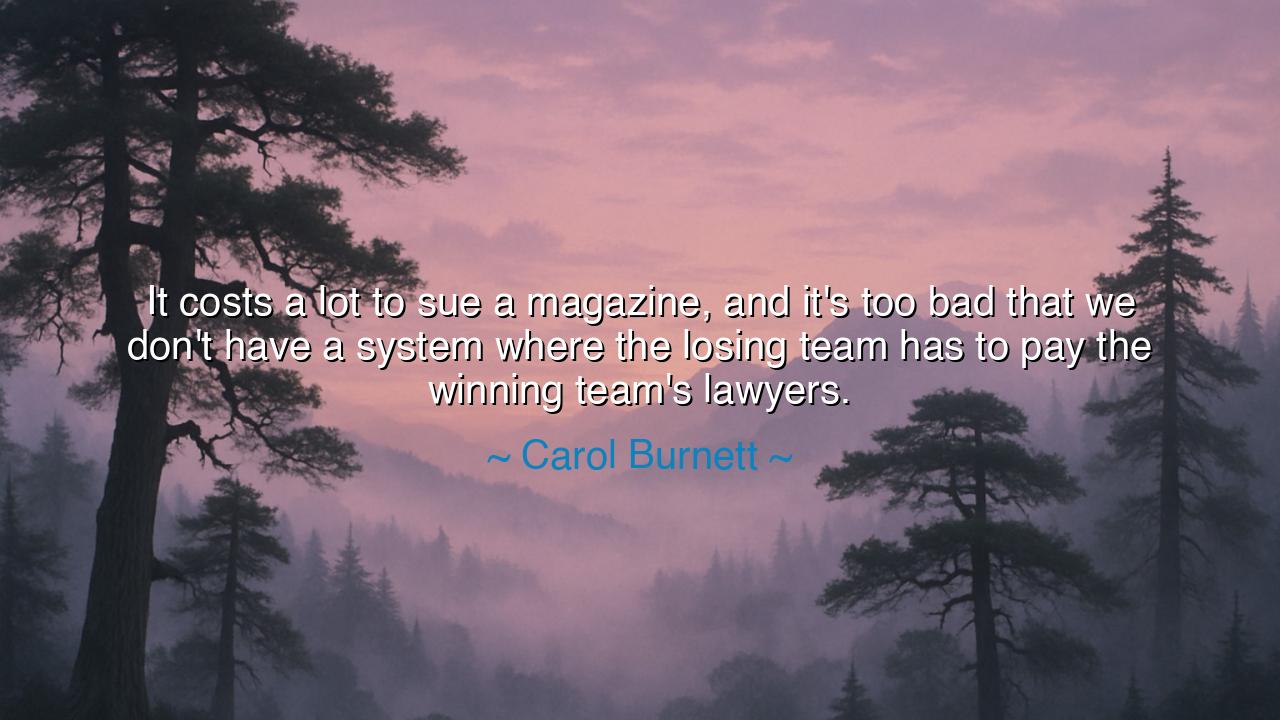
It costs a lot to sue a magazine, and it's too bad that we don't
It costs a lot to sue a magazine, and it's too bad that we don't have a system where the losing team has to pay the winning team's lawyers.






Hear, O seeker, the voice of Carol Burnett, the great lady of comedy, who once revealed a truth forged not in laughter but in struggle: “It costs a lot to sue a magazine, and it’s too bad that we don’t have a system where the losing team has to pay the winning team’s lawyers.” These words, though simple, carry the weight of battle, for they arose not from idle speculation, but from Burnett’s own war against slander, when she dared to confront the mighty press and hold them accountable for their words.
The meaning of this teaching is clear: the path of justice is often barred by the walls of expense. To sue for truth, to demand fairness, to protect one’s dignity against falsehood, requires more than courage—it requires wealth. The poor, though wronged, may have no means to fight, while the powerful, armed with gold and lawyers, wield the courts as shields. Burnett’s words lament this imbalance, and she envisions a system where the burden of legal costs falls upon the one who loses, where the innocent are not impoverished for daring to defend their name.
The origin of this saying is rooted in Burnett’s famous lawsuit against the National Enquirer in 1981. The tabloid had published a false tale, claiming she was drunk and disorderly in public—a wound not only to her reputation, but to her heart, for she had long fought to care for her family and preserve her dignity. She took them to court, though the road was costly, arduous, and filled with uncertainty. At last, she triumphed, proving the report false and malicious. Yet even in victory, she saw the injustice: how many others, less wealthy than she, would never have had the means to fight at all?
History gives us many such examples. Consider the trials of ordinary citizens against powerful corporations. In the twentieth century, families poisoned by unsafe products, or communities destroyed by pollution, often could not afford the long struggle in court. The companies, rich in resources, dragged out cases until the weak surrendered. Without systems of fairness, the courts—meant to protect all—became arenas where only the wealthy could endure. Burnett’s lament is thus not for herself alone, but for all who suffer in silence because justice is too expensive.
Mark this well, O listener: Burnett’s words remind us that the law is not only about right and wrong, but also about access and fairness. To say that “justice is blind” is noble, but if one side must pay a fortune to defend the truth while the other spreads lies without fear, then the scales are tilted, and the blindfold is stained. Systems where the losing party bears the cost of the winner’s legal defense exist in some lands, and they are meant to deter frivolous claims and empower the wronged. Burnett’s vision is that such fairness should be woven into all courts.
Let this be the lesson: in your own life, do not be deceived into thinking that truth alone will triumph. Truth must be defended, and defense requires courage, patience, and often sacrifice. But do not lose heart—every battle fought for fairness, whether won or lost, strengthens the foundation of justice for those who come after. And when you see systems of law that burden the weak while favoring the strong, raise your voice to demand reform. For only when courts are accessible to all can they truly serve as guardians of truth.
Therefore, O child of tomorrow, carry Burnett’s teaching as both warning and hope. Seek not only to defend your own honor, but also to shape a society where the path of justice is open to all, rich and poor alike. Support laws that make litigation fairer, that discourage lies, that protect dignity without crushing the powerless. For when justice becomes a treasure that only the wealthy can afford, it ceases to be justice at all.
Thus, Carol Burnett’s words endure beyond her own trial. They speak as a torch for every generation: that the cost of truth must not be so high that only the few can reach it. Let us build a world where the law defends all, and where the burden of lies falls not on the shoulders of the innocent, but on those who choose deceit.






AAdministratorAdministrator
Welcome, honored guests. Please leave a comment, we will respond soon